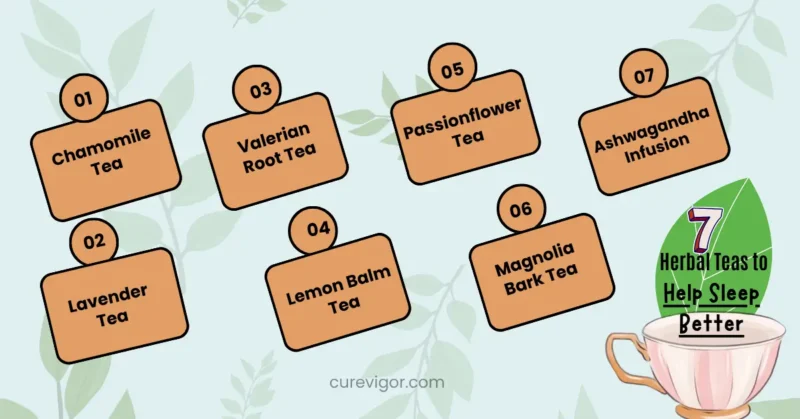Struggling to sleep after your night shift? Learn how these seven calming herbal teas help 3rd shift workers fall asleep faster, lower stress, and rest more deeply—naturally.
Thank you for reading this post, don't forget to subscribe!Ever drag yourself home after a long night shift, exhausted, but once you’re in bed, sleep just won’t come?
Do You Work the 3rd Shift? Discover the 7 Best Herbal Teas for Deep Sleep Naturally
I understand how you feel. I tried every trick in the book throughout my years of working the third shift. White noise apps, blackout curtains, melatonin pills—you name it. And the thing that, of course, helped me have a good night’s sleep? Tea made with herbs.
This advice is for you if you’re having trouble sleeping after working a night shift. We’ll explore why sleep is so difficult after working overnight, how herbal teas gently support your body’s sleep system, and which teas work best, without the need for pills or side effects.
Why 3rd Shift Workers Struggle to Sleep
Working the night shift throws your entire body out of rhythm. Your natural circadian clock expects rest at night and alertness during the day, but you’re doing the opposite. That mismatch alone can lead to shift work sleep disorder, a real and recognized condition marked by chronic insomnia, brain fog, and fatigue.
The artificial light you’re exposed to on your shift also reduces melatonin production—your body’s natural sleep hormone. Add in the higher cortisol levels (your stress hormone), and it becomes nearly impossible to wind down when you need to.

When I was deep in my 3rd shift routine, I’d lie in bed feeling weird, not tired. My brain wouldn’t slow down, no matter how physically exhausted I was.
That’s when I discovered the power of herbal teas.
How Herbal Teas Help You Sleep Deeper
Unlike supplements or sedatives, herbal teas don’t force your body to sleep—they gently guide it into a state of restful sleep. Many herbs contain calming compounds that help relax your nervous system, support the release of melatonin, and naturally lower cortisol levels.
What do I love most? Drinking herbal tea became part of my nightly wind-down ritual. The simple act of brewing, inhaling the steam, and sipping slowly tells your body, “It’s time to rest.”
Here’s what worked for me:
- I’d drink my tea 30–45 minutes before bed.
- I’d steep it strong—about 10 minutes—for maximum effect.
- And I made sure to turn off screens, dim the lights, and stay quiet during my tea time.
The 7 Best Herbal Teas for Sleep (Especially After Night Shifts)
Here are the teas that worked for me—and countless others. They’re caffeine-free, gentle, and backed by centuries of use and modern research.

1. Chamomile Tea
There is a reason this classic is so well-known. Apigenin, an antioxidant found in chamomile, binds to brain receptors to promote relaxation.
On evenings when I was feeling anxious, I drank it. It calmed me, but it didn’t knock me out. I was able to fall asleep more readily because my thoughts had stopped racing.
2. Lavender Tea
Lavender isn’t just for essential oils. When steeped as a tea, it delivers a calming scent and mild sedative effect that eases tension and lowers heart rate.
For me, this tea was beneficial after a stressful shift. If your body feels jittery or your heart is racing, lavender can help restore your body to a normal state.
3. Valerian Root Tea
Valerian is a stronger herbal sleep aid—and yes, it has a slightly unpleasant odor. However it functions. It has been shown to improve sleep quality and reduce sleep latency, or the time it takes to fall asleep.
I only used this one on times when I was having trouble falling asleep. When milder teas aren’t strong enough, it’s a fantastic backup.
4. Lemon Balm Tea
A member of the mint family, lemon balm is well-known for its capacity to elevate mood and lessen stress. It helps reduce mental chatter, particularly after work when you’re overanalyzing.
It became my go-to during busy weeks or after night shifts that left me emotionally drained.
5. Passionflower Tea
If you feel mentally hyper—like your brain is running a marathon—passionflower can help. It slows brain activity, encourages deeper sleep, and reduces restlessness.
On nights I was emotionally overwhelmed, passionflower helped shut off the overdrive.
6. Magnolia Bark Tea
This lesser-known tea is particularly effective in reducing cortisol levels. It’s used in Traditional Chinese Medicine and works well for shift workers who deal with chronic stress.
I noticed deeper, uninterrupted sleep when I added magnolia bark to my routine twice a week.
7. Ashwagandha Infusion
Technically not a tea but an herbal infusion, ashwagandha is a natural adaptogen that supports your adrenal system. It helps balance hormones and reduce anxiety, especially if you’ve been working shifts for months or years.
I noticed more consistent sleep cycles with ashwagandha. It doesn’t knock you out—but it helps your body reset itself.
Best Practices for a Bedtime Tea Ritual
You can’t anticipate miracles after drinking a cup of tea. You need a nightly ritual that signals to your body it’s time to relax if you want to reap the full benefits.
What I found to be most effective:
- Drinking tea in a dim, quiet space
- Turning off lights and screens
- Using the same mug every time (it created a mental cue for rest)
- Avoiding snacks or caffeine after my shift
Please choose one or two teas to start, then switch them up. Avoid making too many adjustments at once. Allow time for the effects of each herb to develop.
Additionally, if you are taking any medications, consult your doctor, as certain herbs may interact with specific pharmaceuticals.
Stories from Other Night Shift Workers
In this, you’re not alone. The opinion from the dozens of other third-shift employees I’ve spoken to is compelling.
“Chamomile and lavender changed my life. I used to get only 4 hours of sleep. Now I sleep a full 6–7 hours almost every day.” – Ava, ER Nurse.
“Valerian is my go-to after emergency calls. It helps me forget the shift and relax.” – James, 911 Dispatcher.
“Not only did ashwagandha help me sleep, but it also helped me get rid of my constant anxiety.” – Marla, Security Guard.
Final Thoughts: Your Herbal Path to Restful Sleep
You don’t have to rely on pills, melatonin gummies, or lying awake, frustrated. Nature has a remedy—and it starts with a warm cup.
Try one tea this week. Create a small ritual. Give yourself space to rest and unwind. You may be surprised at how your body responds when you stop fighting it and start supporting it gently.
And from someone who’s been there—I promise, better sleep is possible.
FAQs
Q. What is the best tea for sleeping during the day?
Through my 3rd shift routine,
- I discovered chamomile to be a gentle and trustworthy friend.
- It relaxes your muscles and quiets your mind without making you groggy.
- Many night shift friends also swear by lavender or lemon balm.
- They calm the nervous system, which helps when your body’s still buzzing from work.
- Drinking them right after your shift, at a moderate temperature, works best.
- Let your room be dark and quiet while sipping.
- That small ritual signals to your brain it’s time to let go.
Q. Can I drink herbal tea right after a night shift?
Yes, and nutritionists recommend it—it’s part of my cool-down routine too.
- Right after I get home, I switch off bright lights, boil water, and sip slowly.
- It helps my heart rate drop and my thoughts become more settled.
- Herbs like valerian root or magnolia bark are most effective at this point.
- Allow 30–60 minutes before lying down for optimal results.
- Additionally, refrain from checking your phone during tea time.
- That mindful moment can make or break your sleep quality.
Q. Is herbal tea better than melatonin pills?
For me, herbal tea feels more natural and kind to the body.
- Melatonin pills sometimes made me groggy or gave me vivid dreams.
- Tea helps me drift off to sleep rather than knocking me out.
- Plus, teas like ashwagandha or passionflower help with stress, not just sleep.
- They offer more than just sedation—they help reset your body.
- And the act of preparing tea becomes a grounding ritual.
- It’s gentle, calming, and safe for long-term use.
Q. How long before bed should I drink my sleep tea?
I usually drink it 20–40 minutes before going to sleep, after my night shift ends.
That’s enough time for the herbs to start their magic.
Make sure to wind down during that time—dim the lights and turn off your screens.
- Avoid drinking too much or too late, as you may wake up to use the bathroom.
- If I know I’m more wired than usual, I drink it earlier.
- Stick with the same schedule each day for best results.
- It’s not just about tea—it’s about creating a rhythm.
Q. Are there any side effects to herbal sleep teas?
Most herbal teas are safe, but everyone’s body reacts differently.
For example:
- Valerian can feel too strong for some people.
- If you’re pregnant, on medication, or have health issues, check with your doctor.
- Start with smaller doses and never mix multiple pungent herbs at the same time.
- Once, I drank valerian and magnolia together and felt foggy the next day.
- That’s how I learned to go slow and observe.
- Listen to your body — it continually speaks up.
Read more Health and Wellness Tips.
You might like:

